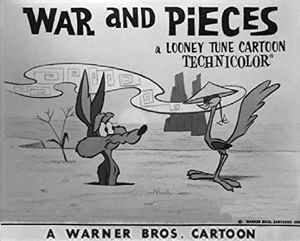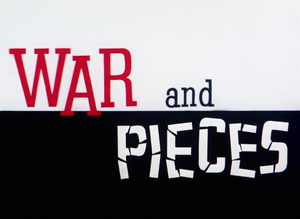War and Pieces
From Looney Tunes Wiki
Jump to navigationJump to search
- This article is about the Looney Tunes theatrical short. For the Taz-Mania episode, see War and Pieces (Taz-Mania).
| War and Pieces | |
|---|---|
 Lobby card. | |
| Production company | Warner Bros. Cartoons |
| Distributor | Warner Bros. Pictures |
| Release date | June 6, 1964 |
| Run time | 6:40 |
| Starring | Paul Julian |
| Producer(s) | David H. DePatie |
| Music composition | Bill Lava |
| Story | John Dunn |
| Animation | Ken Harris Richard Thompson Bob Bransford Tom Ray |
| Director(s) | Chuck Jones |
| Series navigation | |
| ← Previous | Next → |
| Title card | |

| |
War and Pieces is the four hundred and fortieth Looney Tunes theatrical short. It was distributed by Warner Bros. Pictures on June 6, 1964. It was written by John Dunn, produced by David H. DePatie, and directed by Chuck Jones.
Wile E. is ever on the hunt for Road Runner, but one of his attempts causes him to end up in China and encounter another Road Runner.
Detailed Summary
Characters
In order of appearance: | ||||||||||
| ||||||||||
Locations
- Earth
- United States
- Southwest desert
- China
- United States
Organizations
Objects
- Grenade
- Archery bow tied to cactus with pulley and strings
- Hydraulic press
- Acme Invisible Paint
- Booby-trapped "Secrets of a Harem" Kinetoscope
- Grappling Hook
- Doodlebug rocket
- Gong
Vehicles
- Truck
Production
Development
Filming
Music
The music was scored by Bill Lava.
Crew credit
- Co-director: Maurice Noble
- Layouts: Dave Rose
- Backgrounds: Philip DeGuard
- Film editor: Treg Brown
Release
Dates are in order of release:
- United States: June 6, 1964 in theatres
Behind the scenes
- The title is a play on the novel War and Piece by Leo Tolstoy.
- This was the last short Chuck Jones had worked on before he left Warner Bros. He would not return until 1979 to help out with some television specials, under Chuck Jones Enterprises.
- This entry does not count Zip Zip Hooray! and Road Runner a Go-Go, as those two shorts are cut-down sequences from the featurette film, Adventures of the Road-Runner.
- It was the last Road Runner cartoon of the golden age of American animation to use the Latin names gag.
Error
- The "The End" card is supposed to be translated from an old Chinese proverb (which come from the stereotypically Chinese Road Runner), although the writing in question doesn't appear to come from the actual language itself.
Critical reception
In other languages
| Language | Name | Meaning |
|---|---|---|
Home availability
- In the United States:
- March 12, 2024: Warner Bros. Home Entertainment releases Looney Tunes Collector's Choice: Volume 3 on Blu-ray.